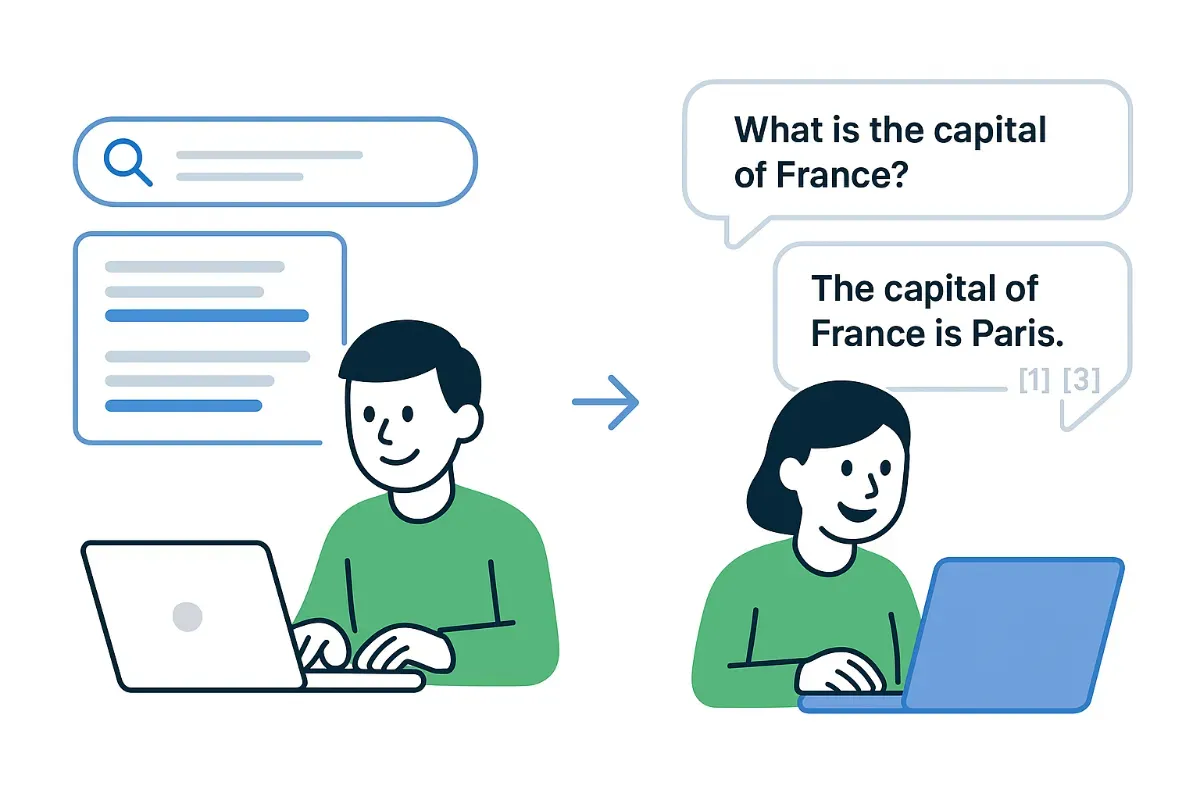
The Search Revolution is Here
Traditional search engines show you links to websites. AI search engines give you direct answers. ChatGPT Search, Google AI Overview, Perplexity, and Claude all generate responses using information from across the web.
This shift changes everything about SEO. Instead of optimizing for click-throughs, you optimize for being cited as a source. Your content needs to feed AI systems that create answers for users.
Companies that adapt early gain massive advantages. AI search engines often cite the same high-quality sources repeatedly, creating compound visibility benefits.
Understanding AI Search Engines
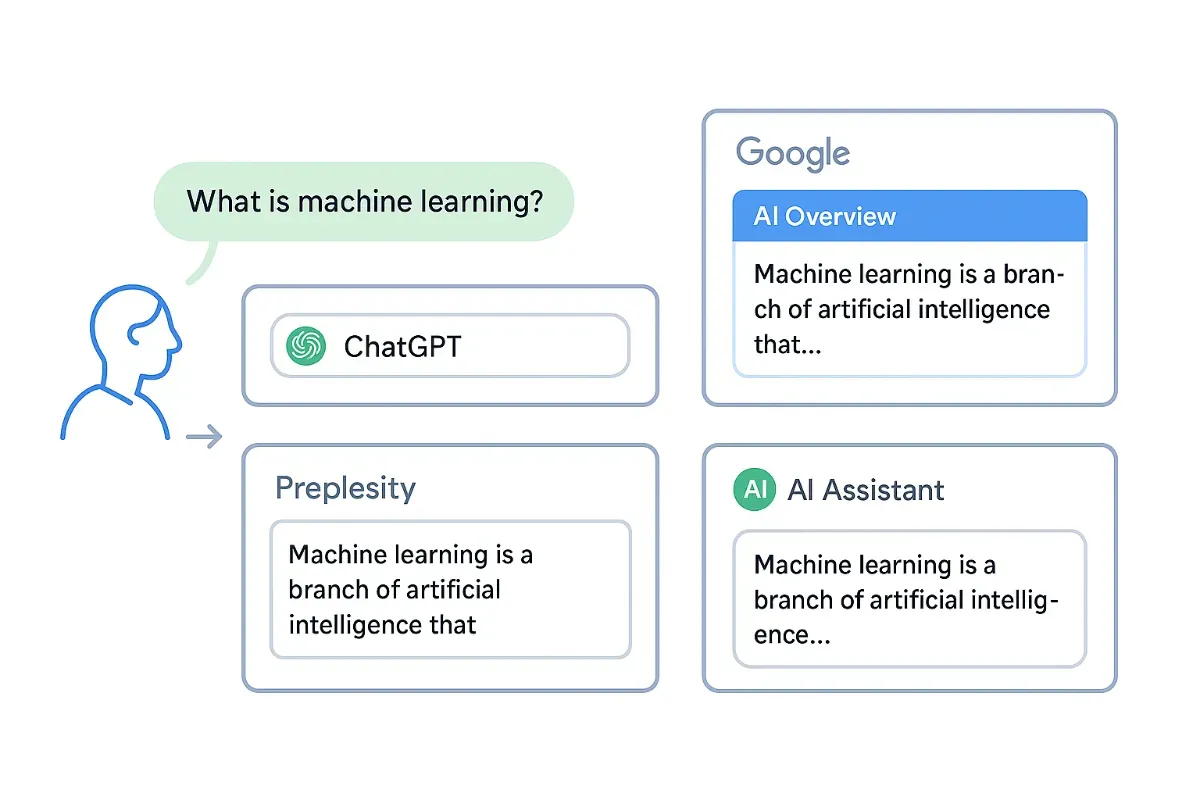
OpenAI's search feature pulls real-time information and cites sources in conversational responses. It favors authoritative, well-structured content that directly answers questions.
Google's generative search results appear at the top of search pages. They synthesize information from multiple sources to create comprehensive answers.
This AI search engine focuses on research and fact-finding. It provides detailed citations and allows users to dig deeper into topics.
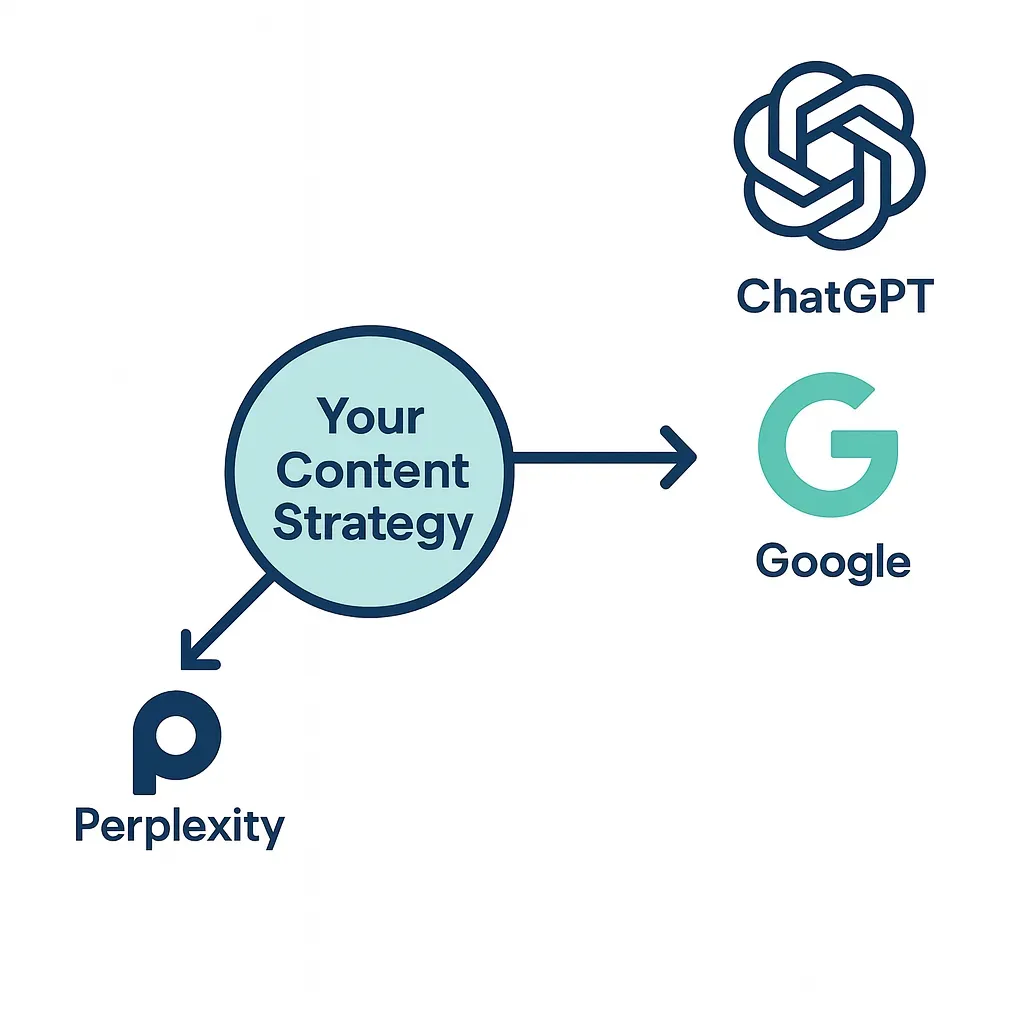
Many AI assistants now include web search capabilities. They reference current information when generating responses to user queries.
New AI search engines launch regularly. Microsoft Copilot, You.com, and others compete for market share with unique approaches.
What is Answer Engine Optimization (AEO)?
Answer Engine Optimization means structuring your content so AI systems can easily extract and cite it when generating responses. Unlike traditional SEO that focuses on rankings, AEO focuses on being selected as a source.
AEO requires content that directly answers questions, provides clear facts, and uses structured formatting. AI systems prefer content they can quote confidently without confusion.
The goal shifts from getting clicks to getting citations. When AI systems cite your content repeatedly, you build authority and drive qualified traffic from people who want to learn more.
🎯 See How Your Content Performs in AI Search Today
Check your current AI visibility across ChatGPT, Perplexity, Claude, and Google AI Overviews.
Check Your AI Visibility
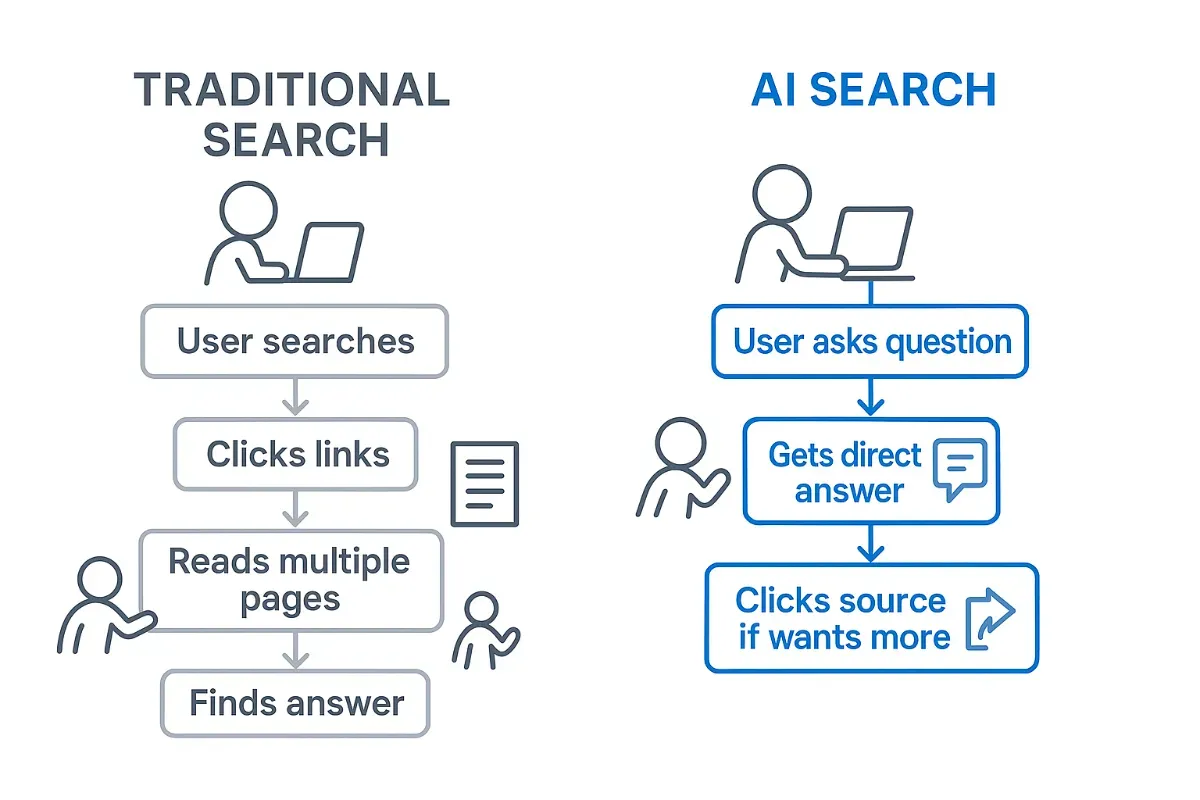
Understanding Generative Engine Optimization (GEO)
Generative Engine Optimization targets AI systems that create new content based on existing information. These systems need high-quality source material to generate accurate responses.
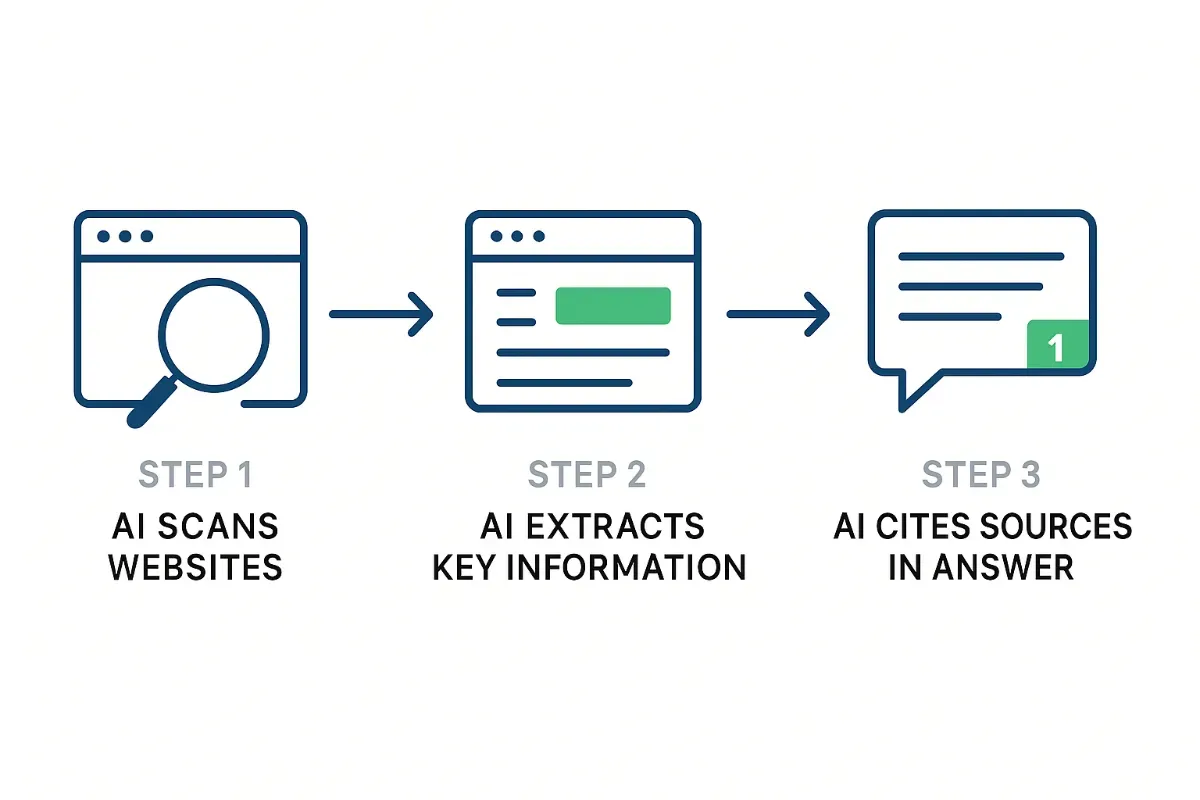
GEO focuses on becoming the preferred source for specific topics or questions. When AI generates content about your area of expertise, you want your information included in the knowledge base.
This approach requires deep expertise and comprehensive coverage of topics. Surface-level content rarely gets selected by generative AI systems.

How pSEO Powers AI Search Success
Programmatic SEO lets you create comprehensive coverage of topics at scale. AI search engines favor sources with deep, authoritative content across related subjects.

pSEO templates ensure consistent formatting that AI systems can parse easily. Well-structured data gets extracted and cited more frequently.
AI search engines often prefer recent information. pSEO systems can update thousands of pages when facts change, keeping your content current.
You can use pSEO to generate pages that directly answer common questions in your field. This matches how people interact with AI search engines.
pSEO templates can include elements that make citation easier for AI systems: clear attributions, publication dates, and author credentials.
💡 See AI-Optimized Content in Action
Explore examples of programmatic SEO portals that get cited by AI engines. See how cybersecurity and B2B SaaS companies structure content for maximum AI visibility →
See AI-Optimized Content in Action
The Future of SEO is Changing
Success metrics shift from search rankings to citation frequency. Being mentioned by AI systems becomes more valuable than ranking first for specific keywords.
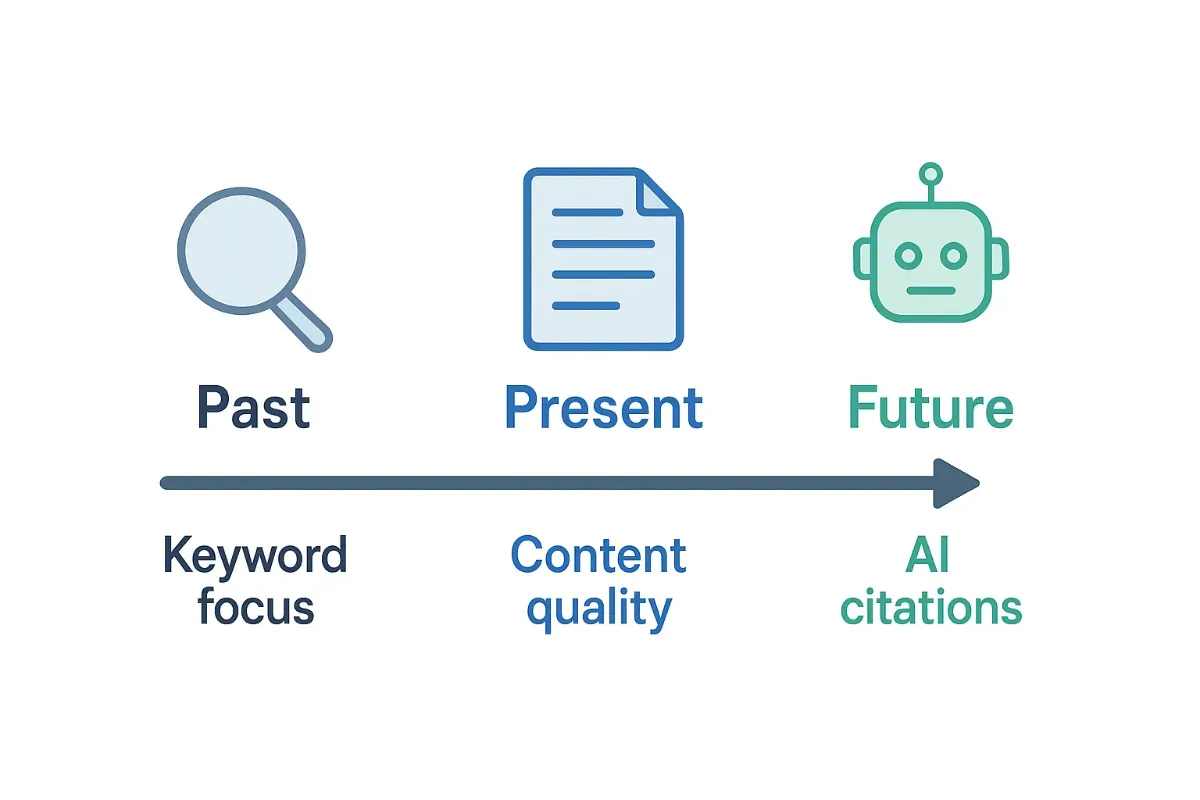
AI systems understand context better than traditional search engines. Comprehensive content that covers topics thoroughly outperforms keyword-stuffed pages.
AI systems prefer citing authoritative sources. Building expertise, authoritativeness, and trustworthiness (E-A-T) becomes even more important.
AI search engines excel at understanding what users actually want. Content that genuinely helps people gets prioritized over SEO-optimized fluff.
AI systems increasingly process images, videos, and audio alongside text. Future optimization requires diverse content formats.
Building Your Generative AI Search Strategy
Study how AI systems currently cite content in your industry. Look for patterns in the types of sources and formatting they prefer.
Find questions where AI systems give incomplete or outdated answers. These represent opportunities to become the preferred source.
Develop content that AI systems can cite confidently. Include clear facts, recent data, and expert insights that add genuine value. Learn how B2B SaaS companies structure authoritative content for AI citations.
Structure content so AI systems can easily extract key information. Use clear headers, bullet points, and factual statements.
Track when AI systems mention your content. Tools are emerging to monitor citations across different AI platforms.
Content Structure for AI Optimization
Start pages with the specific question you're answering. AI systems often look for this direct question-answer structure.
Include clear, verifiable facts that AI systems can cite. Avoid opinions or subjective statements in key sections.
Clearly attribute information to original sources. AI systems prefer content that shows its own sources and methodology.
Include publication and update dates prominently. AI systems often prefer recent information when generating responses.
Highlight author expertise and credentials. AI systems consider source authority when selecting citations.
For cybersecurity companies, this means covering comprehensive keyword sets that AI engines reference. Explore the 2,500+ cybersecurity keywords that AI search engines commonly use when generating security-related answers.
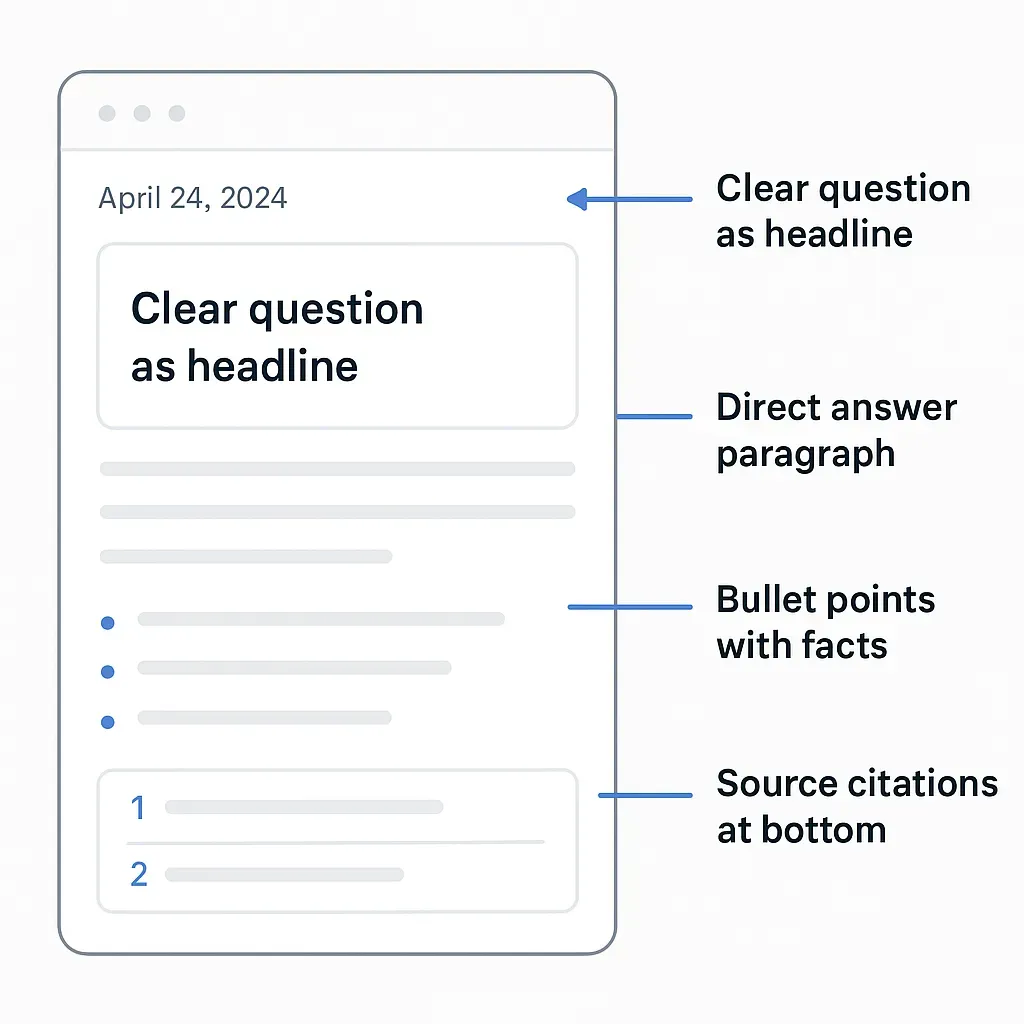
Technical Implementation for AI Search
Use structured data to help AI systems understand your content context. FAQ schema, article schema, and organization markup work particularly well.
Design content systems that can feed information to AI platforms directly. Some AI systems may access content through APIs rather than web crawling.
Structure content with clear attributable sections. AI systems need to understand what information comes from your source versus external references.
Organize content around topics and concepts rather than just keywords. AI systems understand semantic relationships better than keyword matching.
Different AI systems may prefer different content formats. Test your content across multiple AI platforms to understand preferences.

Key Benefits of AI Search Optimization
As AI search grows, traditional search may decline. Early optimization ensures continued visibility as user behavior shifts.
Users who find you through AI citations often have higher intent. They've already received an answer and want to learn more.
Regular citations by AI systems build your authority over time. This creates a snowball effect where you get cited more frequently. See proven results from companies achieving 60% increases in AI visibility.
Most companies haven't adapted to AI search yet. Early movers can establish dominance before competition intensifies.
One piece of optimized content can get cited across multiple AI platforms, multiplying your visibility.
Measuring Success in AI Search
Monitor how often AI systems mention your content. Track which pieces of content get cited most frequently across different platforms.
Measure the quality of traffic from AI search platforms. These users often have higher engagement and conversion rates.
Track increases in brand mentions and thought leadership recognition as AI systems cite your expertise more frequently.
Monitor whether you become the go-to source for specific topics or questions in your industry.
Compare your citation rates to competitors. Identify gaps where you could become the preferred source.
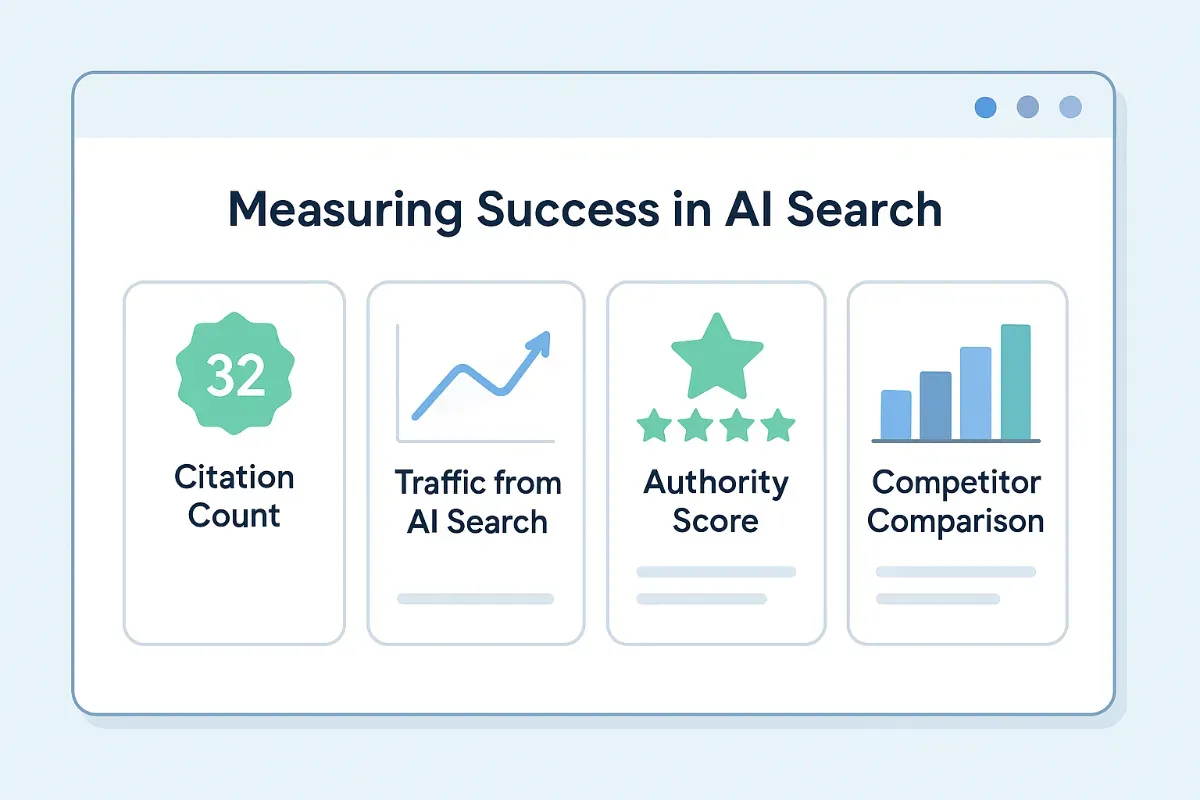
Common Mistakes to Avoid
AI systems understand context well and penalize obvious keyword manipulation. Focus on natural language that genuinely helps users.
Brief, shallow content rarely gets cited by AI systems. Invest in comprehensive coverage that demonstrates real expertise.
AI systems prefer current information. Letting content become stale reduces citation opportunities.
Failing to cite your own sources reduces credibility with AI systems. Always show where your information comes from.
Creating content for AI systems without considering user needs leads to poor performance. AI systems prioritize genuinely helpful content.
Advanced Strategies for AI Search Success
Create comprehensive clusters of related content. AI systems often prefer sources that cover topics thoroughly rather than superficially.
Include quotes and insights from recognized experts. AI systems value content that demonstrates access to authoritative sources.
Provide unique data, research, or analysis that AI systems can't find elsewhere. Original insights get cited more frequently.
Create content in various formats: text, images, videos, and interactive elements. Different AI systems may prefer different formats.
Build communities around your expertise. User-generated content and discussions can provide additional citation opportunities.
Building Your Implementation Roadmap
- Study current AI search behavior in your industry
- Identify top citation opportunities and content gaps
- Analyze competitor citations and content strategies
- Define success metrics and tracking methods
- Create content templates optimized for AI citation
- Develop question-answer content frameworks
- Plan topic clusters and authority-building content
- Design technical implementation approach
- Generate pilot content using AI-optimized templates
- Implement structured data and technical optimizations using proven programmatic SEO approaches
- Test content across multiple AI platforms
- Set up citation monitoring and tracking systems
- Monitor initial citation performance across platforms
- Refine content based on AI system preferences
- Optimize technical implementation for better extraction
- Document successful patterns and approaches
- Scale successful content types across more topics
- Expand to additional AI platforms and search engines
- Develop automated content optimization processes
- Build long-term authority and citation momentum
Tools and Technologies for AI Search Optimization
- Custom monitoring scripts for AI platform mentions
- Brand monitoring tools adapted for AI citations
- Analytics dashboards for multi-platform tracking
- Alert systems for new citation opportunities
- AI content analysis tools for optimization suggestions
- Structured data testing and validation tools
- Multi-platform content testing environments
- Citation-friendly content management systems
- Schema markup generators for AI optimization
- API development for direct AI platform integration
- Content extraction testing tools
- Performance monitoring for AI crawler access
- AI search behavior analysis tools
- Competitor citation tracking systems
- Topic opportunity identification platforms
- User intent analysis for AI search queries
Tools to help you with AI search visibility
Writesonic: Best for Generative Engine Optimization and Scalable AI-Driven Content Creation
Writesonic empowers teams to optimize their content specifically for AI search platforms such as Google AI Overviews, Bing Copilot, ChatGPT, and Perplexity through its Generative Engine Optimization (GEO) framework. It focuses on creating AI-native content that aligns with how large language models generate answers, improving your chances of being discovered and cited by AI engines.
Ideal for marketers and SEO teams aiming to future-proof their content strategy, Writesonic helps bridge the gap between traditional SEO and the emerging needs of generative search by providing real-time optimization suggestions and scalable content creation tools.
- GEO-powered content generation tailored for LLMs
- Optimization for multiple AI search platforms including Google SGE and ChatGPT
- Keyword and topic insights based on AI search intent
- Scalable SEO content automation with built-in AI ranking guidance
Future Developments to Watch
New AI search platforms continue launching. Each may have different content preferences and citation behaviors.
Google and other traditional search engines increasingly integrate AI features. The line between traditional and AI search continues blurring.
Some AI platforms may offer direct content integration APIs, allowing real-time content feeding rather than web crawling.
AI search engines may become more personalized, affecting which sources get cited for different users.
AI search increasingly includes voice queries and image search, requiring optimization for different input types.
Getting Started Today
- Add FAQ sections to existing pages using structured data
- Include clear publication dates and author credentials
- Structure existing content with better headers and factual statements
- Monitor current AI citations of your content
- Create comprehensive topic clusters around your expertise
- Develop question-answer content specifically for AI search
- Implement advanced schema markup for better content understanding
- Build relationships with other authoritative sources in your field
- Become the definitive source for specific topics in your industry
- Develop unique data and insights that AI systems can't find elsewhere
- Build authority that makes AI systems prefer citing your content
- Scale successful approaches across all your content
🚀 Ready to Dominate AI Search?
GrackerAI automates everything covered in this guide: AI-optimized content creation, programmatic SEO portals, and citation tracking across all major AI engines.
Start free with 50 pages (no credit card required) →